In a world where takeout reigns supreme and cereal is a breakfast staple, it’s time to unleash the culinary geniuses hiding in our kids. Cooking lessons for kids aren’t just about whipping up a mean mac and cheese; they’re a gateway to creativity, confidence, and maybe even a few kitchen disasters that lead to laughter. Who knew that flour fights could spark a lifelong passion for cooking?
Table of Contents
ToggleOverview of Cooking Lessons for Kids
Cooking lessons for kids promote essential life skills and foster a love for food. They provide children with hands-on experience, teaching them how to create various dishes. Through these lessons, kids learn the importance of healthy eating and make better food choices.
Each lesson often includes safety practices in the kitchen. Students develop confidence as they navigate cooking tasks, mastering techniques like chopping, measuring, and following recipes. Engaging in group activities fosters teamwork, as children collaborate on preparing meals.
In addition to practical skills, lessons spark creativity. Children experiment with flavors, creating unique recipes or modifying existing ones. At the same time, they gain an understanding of cultural diversity through international dishes, broadening their culinary horizons.
Many programs also emphasize nutrition education. Kids discover ingredients’ nutritional value, making connections between food choices and their well-being. This knowledge empowers them to cook nutritious meals rather than relying on processed options.
Classes cater to different age groups and skill levels. Young children may start with simple, no-cook recipes, while older kids tackle more complex dishes. Instructors often adjust lessons to suit individual preferences, ensuring engaging experiences for all participants.
Hosting cooking lessons at home or in community centers increases accessibility. Families can encourage their children to join group classes or participate in online courses, providing flexibility. Overall, cooking lessons equip kids with valuable life skills, building a foundation for independence in the kitchen.
Benefits of Cooking Lessons

Cooking lessons provide numerous advantages for children, contributing to their overall development and well-being. These classes instill skills that extend beyond the kitchen.
Life Skills Development
Life skills gain importance during cooking lessons. Children learn kitchen safety, mastering essential techniques like chopping and measuring. Problem-solving enhances through recipe execution, allowing kids to navigate challenges. Time management skills emerge as they balance multiple tasks at once. Independence in the kitchen starts with the confidence to prepare meals on their own. Additionally, group activities build teamwork, fostering social skills through collaboration. Engaging in these practical experiences lays a foundation for responsible adulthood. Knowledge gained through cooking also encourages planning and organization, vital skills in daily life.
Encouraging Healthy Eating
Healthy eating habits begin to form through cooking lessons. Children discover the nutritional benefits of various ingredients, enhancing their awareness of food choices. They explore preparing meals from scratch, which often leads to a preference for whole foods over processed options. Engaging with fresh fruits and vegetables fosters a love for healthy ingredients. Gaining hands-on experience encourages them to try new flavors and expand their palate. Nutrition education integrated into lessons empowers kids to make informed choices about their meals. Understanding the importance of balanced diets strengthens their connection to healthy eating. Overall, cooking lessons promote a lifelong appreciation for nutritious foods.
Types of Cooking Lessons Available
Cooking lessons for kids come in various formats, catering to different learning styles and preferences. These classes can be tailored to suit a child’s age and skill level, ensuring engaging experiences.
In-Person Classes
In-person classes offer hands-on learning environments where kids can interact directly with instructors. These settings foster collaboration among peers, encouraging teamwork during cooking activities. Participants often enjoy making international dishes, creating a fun atmosphere for culinary exploration. Local community centers and culinary schools commonly host these classes, making them widely accessible. Kids also learn kitchen safety and essential techniques, facilitating a practical understanding of cooking. Such experiences help build confidence and motivate children to experiment with new recipes.
Online Cooking Courses
Online cooking courses provide flexibility, allowing kids to learn from home at their own pace. These programs often feature video tutorials, interactive quizzes, and virtual chef demonstrations. Participants can explore a wide range of culinary topics, from basic meal preparation to complex cuisine styles. Parents benefit from the convenience of scheduling classes around their routines. Children also gain an appreciation for diverse cultures through virtual lessons that focus on international recipes. Engaging with peers through online platforms encourages social interaction, despite the physical distance. Overall, online courses expand access to culinary education while promoting creativity in the kitchen.
Recommended Cooking Lesson Programs
Several engaging cooking lesson programs exist to introduce kids to the culinary world. These selections include opportunities at local community centers and through online platforms.
Local Community Centers
Local community centers frequently offer cooking classes designed for various age groups. Participants can enjoy hands-on learning experiences while interacting with instructors and peers. Classes often focus on different cuisines, encouraging kids to explore and create diverse dishes. Instructors emphasize kitchen safety practices and proper cooking techniques. These social settings promote teamwork as children collaborate on recipes, enhancing their communication skills. Accessibility remains a priority, with classes tailored to accommodate beginners and those with more experience. Families often appreciate flexible schedules that align with their availability, making it easier for children to participate.
Online Platforms
Online platforms provide a convenient alternative for young aspiring chefs. Courses often include video tutorials and step-by-step guides, allowing kids to learn at their own pace. Diverse topics cover everything from baking to international cuisine, fostering creativity in the kitchen. Virtual cooking classes feature live chef demonstrations that engage children in real-time. Parents find online options particularly beneficial for busy schedules, as they can be flexible and adaptive. Many programs also encourage kids to share their culinary creations on social media, promoting confidence in their skills. By participating in these online classes, young cooks gain valuable experience and ignite a passion for cooking.
Tips for Choosing the Right Cooking Class
Selecting the right cooking class involves several important factors. Parents should consider age appropriateness and instructor qualifications to ensure a positive experience.
Age Appropriateness
Cooking classes cater to different age groups, so choose one that aligns with a child’s developmental stage. Classes designed for younger kids often focus on basic skills like measuring and mixing, while older children may explore more complex techniques and recipes. Engaging and age-appropriate lessons keep kids motivated and excited about cooking. Programs should also accommodate varying skill levels, making sure everyone feels included and challenged appropriately.
Class Size and Instructor Qualifications
Smaller class sizes enhance individual attention and interaction in cooking lessons. When classes maintain a lower student-to-instructor ratio, children receive more guidance and support. Instructors’ qualifications play a crucial role in providing effective instruction. Look for chefs with experience in teaching children, as they often employ fun, interactive methods that resonate with young learners. Background checks and certifications ensure safety and professionalism in the kitchen environment.
Cooking lessons for kids offer a unique opportunity to nurture creativity and build essential life skills. By engaging in hands-on culinary experiences, children not only learn to prepare nutritious meals but also develop confidence and independence in the kitchen. These lessons foster teamwork and social skills while promoting a healthy relationship with food.
As kids explore different cuisines and cooking techniques, they gain a deeper appreciation for cultural diversity and nutrition. Whether through in-person classes or online courses, the benefits of cooking lessons extend far beyond the kitchen. Parents can feel confident that investing in these experiences will spark a lifelong passion for cooking and healthy eating in their children.




